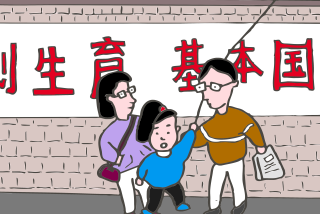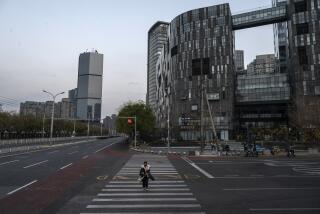In China, Saving Face Means More Than Saving Children
- Share via
Last year, the Chinese film “Not One Less” depicted a poignant story of a rural elementary school so impoverished that the kids elect to carry heavy bricks in the hot sun to earn enough change to buy some chalk. When the teacher must take an extended leave, a 13-year-old is enlisted to be the substitute. Seen through the director’s artful eye, there are no bad people, only ignorant country bumpkins and busy townspeople.
Now picture another impoverished rural school, southwest of Shanghai, bursting with the chatter of little kids working not in a brickyard of their own volition, but on their hands and knees mounting fuses in firecrackers day after day. Imagine the frustration of poorly educated parents who are pained to learn their only child, their pride and joy, is being used as coolie labor to supplement the school’s paltry budget. This school--the only one within miles--doubles as a fireworks factory and storage space for explosives. Imagine the dread the parents feel when they learn there is no recourse; the schoolmaster enjoys the unwavering support of the local Communist Party.
One day, a sudden blinding explosion snuffs out dozens of young lives, leaving many others charred, badly burned or crippled. Eyewitnesses say it was the fireworks, and the first reporters on the scene confirm this finding. But the police take over and keep reporters away from the blast scene while the rubble is cleared. Distraught parents turn their anger on the local officials who transformed a modest school into a factory from hell.
Having a bunch of kids get blown to pieces while making fireworks in the classroom is too depressing and unredeemed for Hollywood fare, let alone Beijing censors ever conscious of losing face. So within a day of the explosion there’s an alternative script to consider. The explosion part of the story is unchanged since the building no longer exists, and the horrific death toll is not pared down much, but the perpetrator is now a lone madman rather than the Communist Party-authorized school work program.
A 33-year-old man, known affectionately as “Psycho” in the village because of apparent mental retardation, bikes to the school, drops a bomb on the teacher’s desk, and boom, annihilates 42 innocent people--though the eyewitnesses close enough to see him do so were miraculously spared. The mad bomber leaves a rational note explaining his crazed actions, which is like a “get out of jail” card for the schoolmaster and the local party branch.
Lo and behold, the Psycho story, despite the protestations of the local folk, becomes the state-approved narrative, to be propagated at the expense of all other possible explanations. Meanwhile, China’s confused, news-hungry journalists are kept away from the crime scene, and some grieving victims even find their telephone service inexplicably cut.
The fact that the Chinese Communist Party’s authorized version of events in the Fanglin school blast earlier this month is being challenged by Chinese journalists in China is a testament to their courage and sound journalistic instincts. Many journalists in China, even in Hong Kong, took Premier Zhu Rongji’s 1999 edict about fearlessly reporting the truth to heart. So it is doubly disheartening when Zhu, the only top leader who could remotely be considered a mentor for journalism in China, gets the assignment from the party’s Central Committee to be the voice of the new, improved version of the truth. The party has a long tradition of asking the leader least likely to support a policy to be its public face as a test of loyalty, as when Mao Tse-tung asked Deng Xiaoping to go after the rightists in the 1950s or when Deng’s reformist heirs (Hu Yaobang, Zhao Ziyang) were pressured to contain reformist student movements.
Whether it is putting Zhu in the hot seat to denounce Taiwan in March 1999 or more recently to vilify the Falun Gong, one gets the sense that he is being asked, in the name of party unity, to play roles he doesn’t relish. The other possible conclusion is that Zhu is no different from the hard-liners in the party, which is precisely the impression enforced party discipline seeks to convey.
Whatever the reason for the school blast, it is part of a troubling pattern of impoverishment and neglect of education in rural China. And if the true story of what happened has been covered up to get the Communist Party off the hook, then the tragedy goes far beyond Fanglin to shame the country as a whole.
More to Read
Only good movies
Get the Indie Focus newsletter, Mark Olsen's weekly guide to the world of cinema.
You may occasionally receive promotional content from the Los Angeles Times.









